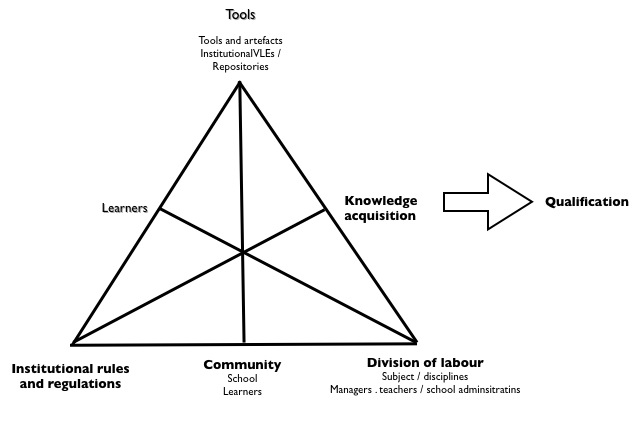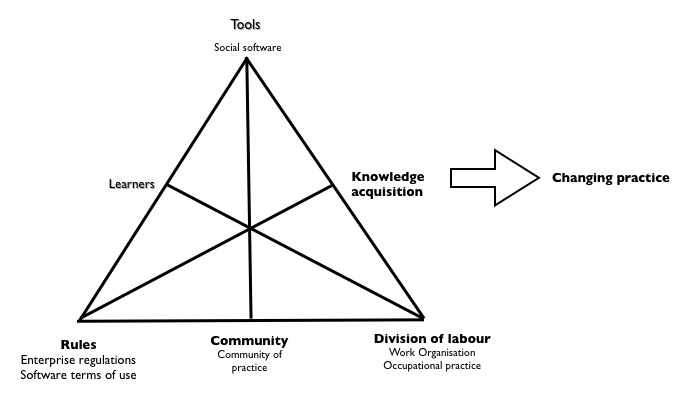More on scoping Open Education. In this series of blog posts I am trying to extend beyond our present focus on Open Educational Resources and look at the different dimensions of Open Education. These include include artefacts and tools, communities, Curriculum, pedagogy and the organisation and recognition of learning
I am not going to try to define any of these, still less to try to put forward any form of construct for measuring openness. Instead I want to try to explore the dimensions of these different ways of understanding open education and what they might mean in practice.
I have already written extensively on the artefacts and tools which mediate activities and learning. Artefacts and tools include Open Educational Resources and open repositories, cloud and social software as well as Personal Learning Environments.
What is missing at the moment is easy tools for resource discovery (Google is still fairly poor at finding Open Educational Resources).
Communities to support Open Education are more problematic. Institutional communities remain largely limited to those enrolled on a particular course. As David Wiley has pointed out one of the problems of Virtual Learning environments is that the tools and artefacts of such groups are usually deleted at the end of a particular course..
And, of course, we have seen the emergence of communities of practice around different topics, practices and occupations. Such communities are by definition emergent (as practices evolve) and vary greatly in structure and purpose.
According to Wenger, a community of practice defines itself along three dimensions:
- What it is about – its joint enterprise as understood and continually renegotiated by its members.
- How it functions – mutual engagement that bind members together into a social entity.
- What capability it has produced – the shared repertoire of communal resources (routines, sensibilities, artefacts, vocabulary, styles, etc.) that members have developed over time.
Rather than looking to learning as the acquisition of certain forms of knowledge, Jean Lave and Etienne Wenger in their book “Situated learning: Legitimate peripheral participation” have tried to place it in social relationships – situations of co-participation. As William F. Hanks puts it in his introduction to their book: ‘Rather than asking what kind of cognitive processes and conceptual structures are involved, they ask what kinds of social engagements provide the proper context for learning to take place’. It is not so much that learners acquire structures or models to understand the world, but they participate in frameworks that that have structure. Learning involves participation in a community of practice. And that participation ‘refers not just to local events of engagement in certain activities with certain people, but to a more encompassing process of being active participants in the practices of social communities and constructing identities in relation to these communities’
Lave and Wenger see the process of integration in communities as coming through involvement around practice – what they called legitimate peripheral participation. And evidence suggests that may work well for many learners, particularly those in vocational education and training. However it may be far more problematic for academic education or for those whose learning needs (or desires) lay outside present participation in am occupational practice.
We also have a growing number of free and open online courses. However there still remain issues. Firstly, participating in a community of practice, particularly a dispersed community using technologies for communication, does not necessarily provide access to the support learners’ may need. We still lack is an easy way of peer matching for learners – what Vygotsky called a “More Knowledgeable Other.” As Illich said in 1971: “It is amazing that such a simple utility has never been used on a broad scale for publicly valued activity.”
Secondly – and even if a leaner has managed to develop their own Personal Learning Network and has configured their Personal Learning Environment – there remains the issue of how to structure their learning. Traditionally learning has been structured around curricula or course outcomes. Yet traditional curricula, based on expert knowledge of a domain area may not be appropriate to present day needs characterised by the ready availability of information through the internet or indeed to the ideas of open education providing increased leaner autonomy. Dave Cormier says that the present speed of information based on new technologies has undermined traditional expert driven processes of knowledge development and dissemination. The explosion of freely available sources of information has helped drive rapid expansion in the accessibility of the canon and in the range of knowledge available to learners. We are being forced to re-examine what constitutes knowledge and are moving from expert developed and sanctioned knowledge to collaborative forms of knowledge construction. Social learning practices are leading to new forms of knowledge discovery. Cormier sees a movement from expert defined curricula to community based curricula but does not elaborate on how this process might happen.
In putting forward a metric for measuring openness in education, George Siemens talks about the “Systemic integration of openness – i.e. openness is part of the curriculum development process, not as an after market add on.” However, this would appear to be an appeal for transparency in the development process and for linking curriculum development to Open Educational Resources, rather than a basis for open education curricula.
The work of Joss Winn and Richard Hall has probably not received as much attention as it deserves. Joss Winn is particularly concerned with the dependency on tools and services underpinned by oil and technocentric economic, social and educational development in a world faced by growing uncertainties due to declining oil production. In a long blog post entitled “Towards a resilient curriculum for HE”, Richard Hall considers how curricula could prepare learners to deal with uncertainty and change. He also refers to the UK JISC funded Learning Literacies for the Digital Age project. The project final report highlighted the urgency of supporting a differentiation of identities and engagements in multiple spaces:
“there is a tension between recognising an ‘entitlement’ to basic digital literacy, and recognising technology practice as diverse and constitutive of personal identity, including identity in different peer, subject and workplace communities, and individual styles of participation.”
Hall continues
“Illich saw this as critical and believed that a “convivial society should be designed to allow all its members the most autonomous action by means of tools least controlled by others”, in order to overcome regimentation, dependence, exploitation, and impotence. He saw tools as mediating relationships, and as emancipatory where mastery of them in a specific context could be achieved.
There is a complex interplay between the theoretical opportunities of social media for personal emancipation through engagement in contexts for narrative and authorship, and our understanding of how those tools are deployed and owned in reality …. One key issue is how technologies are (re)claimed by users and communities within specific contexts and curricula, in-line with personal integration and enquiry, and in an uncertain world.”
Richard Hall goes on to look at “how to frame a curriculum that enables individuals-in-communities to learn and adapt, to mitigate risks, to prepare for solutions to problems, to respond to risks that are realised, and to recover from dislocations. This demands curricula that may be:
- authentic and meaningful, framed by decision-making and agency;
- enquiry-based, in which skills, approaches, decisions and actions are developed and tested in real-world situations that demonstrate complexity and context;
- cross-disciplinary, and linked to a guild or craft-style experience rather than a Fordist, factory approach;
- negotiated in scope, governance and delivery within authentic, rather than false, communities;
- accredited through the specification of expertise and experience developed within real-world processes and outcomes;
- framed by mentoring and coaching; and
- focused upon co-governance, rather than co-creation”
In seeking to frame a curriculum to allow individuals in communities to deal with the challenges of the changing environment, Hall puts forward the basis for curricula design for Open Education.
The ideas put forward by Richard Hall are remarkably similar to those advanced by Willem Wardekker in comparing Critical and Vykotskian ideas of education.
Wardekker outlines key aspects of Vygotsky’s theory:
- Identity becomes understandable only in connection with social relations.
- Vygotskian theory has the ability of conceptualizing the plurality of such relations. It can recognize that positions, perspectives, and cultural resources may be inconsistent with each other without one or more of them being false.
- Plurality may be seen in Vygotskian theory not only as a characteristic of society, but also as a characteristic of human personality. It is not the social structures themselves that are internalized, but the meaning the individual learns to give to these structures in its interaction with others and in relation to what it has learned before. Internalization is an activity of meaning-giving and digestion … Learning does not mean being fitted with a totally new repertoire of behavior; it consists of qualitative changes in an already existing repertoire. At the same time, learning means learning about yourself: building perspectives on yourself in relation to the learning situations you find yourself in. This may generate a certain continuity, without taking the form of a unified perspective which could be called identity in the accepted sense. In different situations, before different audiences, the individual may be guided by different perspectives which may be partially incompatible. Nor does learning have a definite end; as long as there is contradiction in the social relations, learning occurs and identity keeps changing.
Vygotskian theory, says Wardekker, “has a positive attitude towards such change. … This holds on the individual level (that is, the individual development does not have an end) as well as on the level of society (we can only speak of ‘history’ if and where development takes place).”
Wardekker goes on to look at openness in relation to education.
“In the course of his or her development, each individual learns to handle the facts of change and contradiction in a certain way: either negating them or valuing them negatively, or seeing them as opportunities for development and using them in a positive way. Thus, individuals learn, or do not learn, to manage their own development and that of cultural resources. Education can play a crucial part here by stimulating certain ways of handling contradictions. The stimulation Vygotsky-oriented educators offer will go not in the direction of consistency but of openness. Contradictions should not be resolved or covered too soon. A ‘pluralist attitude’ (Rang, 1993) is an aim of education here. Ideology critique is aimed at situations which impede openness.”
These ideas can provide a starting point for a discussion around curricula for Open Education. Key is the idea of authentic learning in engagement with real-world situations that demonstrate complexity and context. Open education can support learners in developing and exploring their own identities through developing meanings and coping with change and contradictions, both in their own personal contexts and in relation to wider society.

